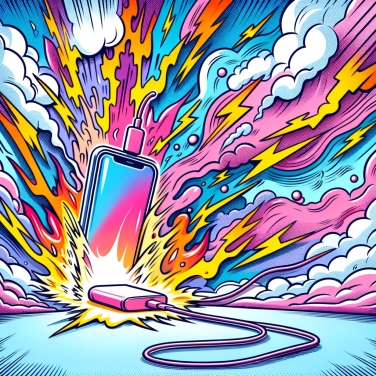When our phone chargers are charging our devices, some of the electrical energy is converted into heat due to the electrical resistance in the circuit. It is this dissipation of energy that can lead to the charger heating up during its use.

When you plug in your charger, it converts the alternating current (AC) from your electrical outlet into direct current (DC) that your battery uses. But no conversion is perfect: some of the energy is lost as heat. This is simply due to the process of changing current and the internal workings of the charger. The more energy it loses, the hotter it gets, and it's this heat that you feel when you touch it after several minutes of charging. It's completely normal as long as it stays reasonable, but a very hot charger often indicates that it is not handling this energy loss well.
Each component of a charger, such as cables, coils, or transistors, has a certain internal resistance. This simply means that they naturally oppose a small resistance to the flow of electric current. As a result, part of the energy that the charger receives does not go directly to your phone but is converted into heat. The higher this resistance, the more it heats up. A worn-out or lower-quality component will therefore heat up more, which is why it is important to have reliable equipment with minimal internal resistance.
A budget charger is often made with low-quality materials, which increases its internal resistance. The more resistance there is, the more losses there are, leading to more heat. In contrast, a quality charger typically uses good-quality copper or aluminum components for internal connections, effective insulating materials, and high-performance electronic circuits. As a result, thermal dissipation is better and the charger heats up much less. A low-end product may also skip key functions like thermal or voltage regulation, which normally allow for precise control of the charging process while limiting heating. In short, when choosing your charger, aiming for the quality of the internal components will often help you avoid overheating and extend its lifespan.
When your phone remains plugged in for a long time after reaching 100%, or when you use it while watching videos or playing resource-intensive games while it charges, the charger is put to the test. This constant demand leads to an increase in temperature due to continuous heat production. The charger works at full capacity non-stop, which reduces its efficiency and produces much more heat than during normal charging. In the long run, this repeated intensive use can cause premature wear on the equipment and seriously increase the risk of overheating.
When your charger is working, it inevitably heats up and must be able to disperse that heat quickly. A charger placed in a closed space or wedged between cushions, sheets, or blankets cannot properly dissipate that heat: it accumulates rapidly and overheats. This accumulation raises the temperature of the components, thereby increasing the risk of premature wear and even failure. In short, without good airflow around the charger, there is no way to cool it effectively: it heats up even more, and the hotter it gets, the more problematic it becomes for your devices, but also potentially for your own safety (risk of fire in extreme cases).
Simply cleaning the USB port of your phone regularly improves energy transfer and reduces unnecessary heat generation while charging.
A charger placed on a blanket or under a pillow quickly accumulates heat, increasing the risk of overheating and reducing the lifespan of the equipment.
Certified chargers (CE, FCC, or manufacturer certifications) adhere to strict standards that limit overheating and the potential risk of fire or property damage.
A cable that is too long or of poor quality increases electrical resistance, leading to significant energy loss and intensifying the heating of both the charger and the phone.
If your charger is overheating excessively, shows visible defects (such as exposed or damaged cables), or takes a long time to charge your phone without any apparent reason, these are clear signs that it’s time to replace it with a new, compliant model.
Use a charger that is suitable for your device, avoid overcharging, ensure proper ventilation around the charger, and prefer certified quality chargers over cheap alternatives. Also, avoid charging your device for extended periods or during intensive phone usage.
Yes, generally, fast charging technologies produce more heat because they deliver a higher electric current. However, high-quality fast chargers are designed with better materials and advanced thermal management to minimize the risks of excessive overheating.
Most modern smartphones have internal power management systems that prevent overcharging. However, regularly leaving your phone plugged in all night can generate constant heat and, over time, may slightly damage the battery or the charger components. It is advisable to charge your phone only for the necessary amount of time.
It is normal for a charger to get slightly warm during use, but if it becomes very hot to the point of burning when touched or emits a strange odor, it is best to unplug it immediately and replace it with a certified model to ensure your safety.

No one has answered this quiz yet, be the first!' :-)
Question 1/5